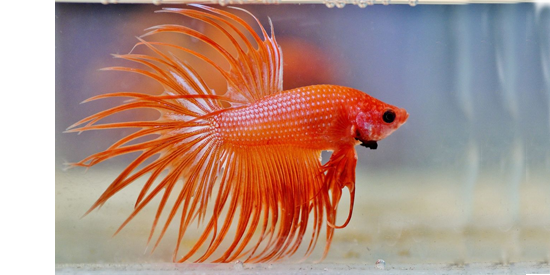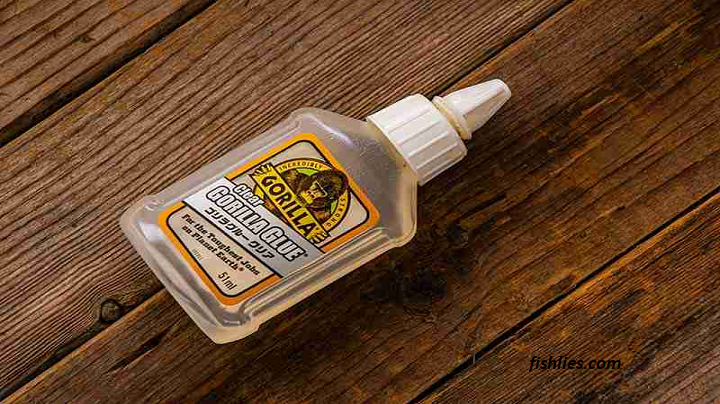A constipated fish is one that is having difficulty passing feces. Fish constipation can be caused by a number of factors, including a change in diet, stress, or an intestinal blockage. It can be difficult to determine if a fish is constipated, but there are some signs to look for, including a bloated abdomen, lethargy, and loss of appetite. Treatment for constipation in fish typically involves adding fiber to the diet or using a stool softener.
There are a number of reasons your fish may be constipated. In this article, we will look at how to identify the signs of constipation in fish and what you can do to treat and prevent it.
What Does A Constipated Fish Look Like?
When a fish is constipated, there are a few key things to look for. First, the fish’s stomach will appear bloated. There may also be some swelling of the abdomen. The fish may also vent more frequently. Finally, the fish’s feces will be dark brown in color. If you see any of these signs, it’s likely that your fish is constipated and in need of treatment.
If you notice that your fish is spending more time than usual at the bottom of the tank and isn’t swimming around as much, it may be constipated. Another sign that your fish is constipated is if it has a swollen belly or its scales are sticking out. If you see any of these signs, there are a few things you can do to help your fish.

A constipated fish may stop eating and exhibit other signs of illness, such as lethargy. The fish may also swim less and have a dark brown vent. If you suspect your fish is constipated, take a close look at its body for any other signs of illness.
If left untreated, constipation can lead to serious health problems in fish and even death.
Causes for Fish Constipation
There are many possible causes for fish constipation. We discuss some of the most common ones.
Incorrect Diet
A diet that is incorrect for a fish’s natural eating habits can cause constipation and other health problems.
There are three major groups of fish: Omnivores, Carnivores, and Herbivores. Each type of fish has different dietary needs.
- Omnivorous fish need a diet that includes both plant and animal material.
- Carnivorous fish need a diet that is mostly or all animal tissue.
- Herbivorous fish need a diet that is mostly or all plant material.
When it comes to the diet of an omnivore, there are a few things that should be kept in mind. First and foremost, an omnivore should not be limited to one type of food. An omnivore should have a varied diet, which includes both plant and animal products. Additionally, an omnivore should make sure that they are getting enough protein and fat in their diet. Too much or too little of either can lead to health problems.

Carnivores have a diet mainly based on meat. This means that they eat mostly animals, and not plants. While there are some exceptions, most carnivores are obligate carnivores, meaning that their bodies are designed to digest and use only animal-based proteins.
Carnivores generally have sharper teeth and stronger jaws than herbivores. This gives them an advantage when it comes to hunting and eating animals.
A lot of people think that herbivore fish only have a diet based on plants. However, this is not the case. Herbivore fish actually have a very diverse diet that includes both plant and animal material. While the majority of their diet may be plant-based, they will also consume small amounts of insects, crustaceans, and other small animals. This helps them to get the nutrients they need to stay healthy and thrive.
Overeating
Overeating can be a big problem for fish. When fish overeat, they tend to get constipated. This is because undigested food and uneaten food can build up in their intestines and make them dirty faster. As a result, constipated fish may have a harder time staying clean and may become more susceptible to disease. If you think your fish are overeating, try feeding them smaller meals more often.
A new study has found that overeating can cause constipation in fish, undigested food, and dirty faster. The study, conducted by researchers at the University of Exeter, looked at the effects of overeating on zebrafish.
The researchers found that when the fish were overfed, they became constipated and their guts became filled with undigested food. This undigested food then rotted, leading to the fish becoming dirty much faster.
The study’s lead author, Dr. Emily Picking, said that this research could have implications for humans as well. “If we understand how overeating affects the gut of a simple animal like a fish, it could help us to understand how it might affect humans,” she said.
So if you’re looking to keep your fish healthy and clean, be sure to avoid overfeeding them.
Poor Water Quality
A new study has found that poor water quality can cause constipation in fish and contain harmful toxins. The research, which was conducted by scientists at the University of Exeter, looked at the effects of different types of water on the digestive system of fish.
The study found that water with high levels of pollutants can irritate the lining of the intestine, which can lead to constipation. In addition, water that contains parasites can also cause problems in the digestive system of fish.
The findings have important implications for the aquaculture industry, as constipation is a common problem in farmed fish. The research could help to improve the health and welfare of farmed fish by identifying ways to improve water quality.
Temperature Changes
A new study has found that temperature changes can cause constipation in fish. The study, which was published in the journal Nature, found that if the water temperature is too warm, it can disrupt the delicate balance of the fish’s metabolism and prevent them from digesting their food properly.
“Our results show that even a small change in temperature can have a big impact on the way fish digest their food,” said lead author Michael Storch, an associate professor at the University of Veterinary Medicine Vienna. “This could have important implications for the health of wild fish populations.”
The study looked at two species of freshwater fish – zebrafish and golden shiners – and found that when the water temperature was increased by just 1 degree Celsius, it led to a significant increase in constipation.
Stale or Spoiled Fish Food
When it comes to feeding your fish, you want to make sure that you are giving them healthy, nutritionally-rich food. However, sometimes fish food can go stale or spoil. If this happens, it can cause constipation in fish.
To avoid this problem, it is important to store fish food properly and to check the expiration date before feeding it to your fish. If the food is stale or spoiled, throw it away and get fresh food.
By following these simple tips, you can help ensure that your fish are getting the nutritious food they need to stay healthy and happy.

Lack of Fiber in the Diet
A lack of fiber in the diet is a common cause of constipation in fish. While constipation is not a serious condition, it can be uncomfortable and may lead to other health problems.
There are a few simple ways to ensure that your fish get enough fiber in their diet. First, offer them a variety of fresh fruits and vegetables. These foods are rich in fiber and other nutrients that are essential for good health. Secondly, make sure that they have access to plenty of clean, fresh water. Water helps to keep the digestive system moving and prevents constipation.
If your fish are still having problems with constipation, there are a number of over-the-counter medications that can help. However, it is always best to speak to a veterinarian before giving your fish any medication.
Surface Feeding
Aquatic creatures have evolved to extract oxygen from water through their gills. Fish have a unique advantage over other aquatic animals because they can also extract oxygen from the air. This is why fish are able to survive in ponds and lakes that have very little dissolved oxygen.
While the ability to extract oxygen from the air is an advantage for fish, it can also lead to problems. One of these problems is constipation. When fish eat surface food, they take in more air than water. This can cause gas and bloating, which can lead to constipation.
Physical Blockages
One of the most common causes is physical blockages. This can occur when fish swallow gravel or stones, or when they consume plants that they cannot digest. In some cases, constipation may also be caused by a build-up of waste products in the intestines.
If you suspect that your fish are constipated, there are a few things you can do to help them out. First, check the water quality and make sure that the pH is within the ideal range for your species of fish. Next, take a look at their diet and see if they are getting enough fiber. If not, try adding some high-fiber foods to their diet. Finally, if the problem persists
Physical Deformities
Intestinal blockages and kinked intestines are common problems in fish that can lead to constipation. These deformities can be caused by a variety of factors, including genetics, poor diet, and bad water conditions.
Balloon fish and fancy goldfish are particularly susceptible to these problems due to their unique body shapes. The balloon fish’s long, slender body makes it prone to intestinal blockages, while the fancy goldfish’s short, stocky body can cause the intestines to become kinked.
Both of these problems can be deadly if not treated quickly. If you suspect your fish is constipated, take it to a vet or experienced fish keeper for treatment.
Internal Tumors
Internal tumors are one of the main causes of constipation in fish. Tumors in the digestive system can block the intestine and prevent food from passing through. This can lead to malnutrition and weight loss. In some cases, the tumor may also rupture the intestine, causing internal bleeding.
Swim Bladder Disease
Swim Bladder Disease is a relatively common disease in goldfish that can cause constipation. The Swim Bladder is a sac-like structure that helps fish to float. If the Swim Bladder is not functioning properly, it can cause the fish to sink and become constipated. There are several possible causes of Swim Bladder Disease, including genetics, poor nutrition, and physical trauma. Treatment for Swim Bladder Disease may involve antibiotics, changes in diet, or surgery.
Stress
Fish are prone to Stress and constipation for a variety of reasons. Poor water quality, overcrowding, and changes in temperature are all common stressors for fish. When fish are stressed, they release a hormone called cortisol. This hormone can disrupt the delicate balance in their digestive system, leading to constipation. In severe cases, constipation can be fatal for fish. Luckily, there are some simple steps that aquarists can take to reduce the stress levels of their fish and help prevent constipation.
Dangers and Side Effects of Fish Constipation
Fish constipation is a common condition that can have dangerous consequences for your fish. The main danger is the build-up of toxins in the fish’s body, which can lead to Hexamita, a parasitic infection. Dropsy, another condition caused by constipation, can also be deadly. If you suspect your fish may be constipated, it’s important to seek veterinary care immediately.
Fish constipation and dropsy are two of the most common health problems that can affect your fish. Constipation is caused by a build-up of waste in the intestines, which can block the passage of food and cause the fish to become bloated. Drops y is a condition that occurs when the kidneys are not able to remove all the toxins from the blood, causing fluid to build up in the body cavity. Both conditions can be fatal if left untreated.
Treating Fish Constipation
There are a few things you can do to help your fish feel better when they’re constipated.
Feed Your Fish a Balanced Diet
A healthy diet for your fish should consist of high-quality pellets or flakes, as well as live or frozen foods like brine shrimp, daphnia, or bloodworms. You can also feed your fish vegetables like zucchini, peas, and spinach. It’s important to feed your fish a balanced diet that includes both herbivore and carnivore foods.
Just like with humans, a balanced diet is key for your fish. Make sure they’re getting plenty of protein, fat, and carbohydrates. A little variety will help them stay healthy and happy!
Introduce Live Plants
- Introducing live plants to your aquarium is a great way to ensure that your fish are getting the fiber they need.
- Not only do live plants benefit the fish, but they also add beauty and interest to the aquarium. There are many different kinds of aquatic plants to choose from, so you can create the perfect environment for your fish.
- Live plants are a natural source of fiber, which is important for a healthy digestive system. They also provide oxygen and help to keep water clean and clear. Anacharis, Hornwort, and Java Fern are all great options for beginner aquarists.
Consider Giving Them A Laxative.
There are a variety of different laxatives that you can give your fish, depending on their needs.
- One way to help a fish with an unbalanced diet is to give them a laxative. Epsom salt is an effective laxative for fish and can help them digest their food properly.
- Aquarium salt is a good laxative for fish, and you only need to use a teaspoon of salt per 5 gallons of water. Simply add the salt to your aquarium and let your fish swim around in it for a while
- Another way to ensure your fish are getting all the nutrients they need is to feed them shelled peas. Peas are a good source of fiber, which can help promote a healthy digestive system.
- One type of fish that does especially well on a high-fiber diet is the carnivore fish. These fish are known for their love of meat, but they can also digest plant matter quite easily. I
- Monitor your fish closely after they have eaten the laxative to make sure they are not experiencing any adverse effects.
Preventing Constipation
A healthy fish digestive system is the key to preventing constipation. Commercial fish food lacks enough dietary fiber, so it’s important to supplement your fish with a high-quality diet. Frozen foods are an excellent source of fiber and nutrients, and they can help keep your fish’s digestive system functioning properly.
Constipation is a common problem in fish, especially herbivore fish that eat mostly algae. There are several things you can do to prevent constipation in your fish.
Make sure they are getting enough algae. Algae is a good source of fiber and nutrients that help keep the digestive system moving.
Add some plants to their diet. Plants are also a good source of fiber and nutrients that can help relieve constipation.
Make sure they have plenty of clean, fresh water to drink. Water helps keep the digestive system moving and prevents dehydration, which can exacerbate constipation.
Conclusion
Constipation is common in fish and can be caused by a number of factors. The most common cause is a change in diet, but other factors such as stress or disease can also contribute. There are a number of treatment options available, but the most effective is to change the diet back to what the fish are used to. Live plants can also help to relieve constipation by providing natural fiber.
Related Question
Can You Squeeze A Constipated Fish?
If you’re wondering whether you can squeeze a constipated fish, the answer is a resounding no. You might think that because they’re slimy and slippery, it would be easy to give them a gentle squeeze and help them along, but this is actually really dangerous for their internal organs.
Can Fish Die From Constipation?
No, fish cannot die from constipation. However, constipation can cause a build-up of toxins in the body which can lead to other health problems.
Can A Fish Survive Dropsy?
Dropsy is a condition that affects fish where their internal organs swell with fluid. In most cases, the fish will die from the condition. However, there are some cases where the fish can survive if they are given a gentle squeeze.







